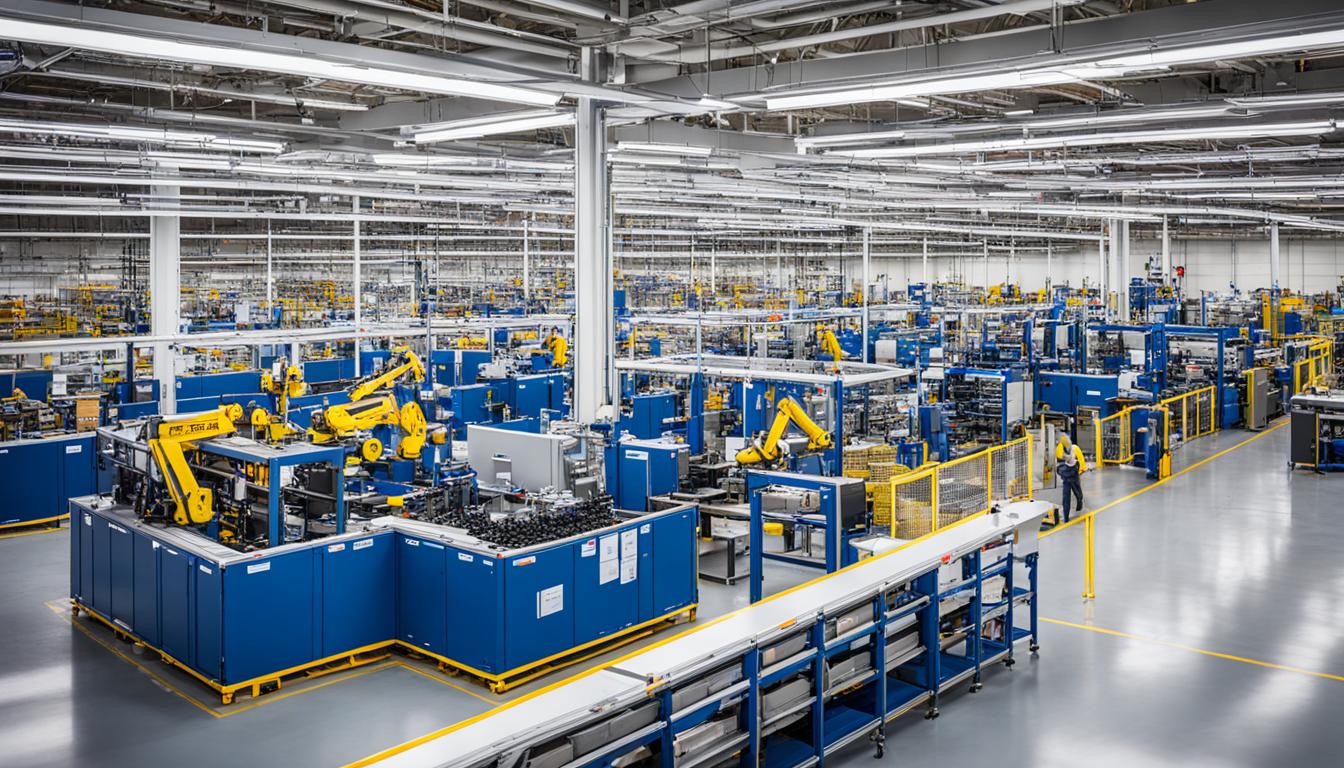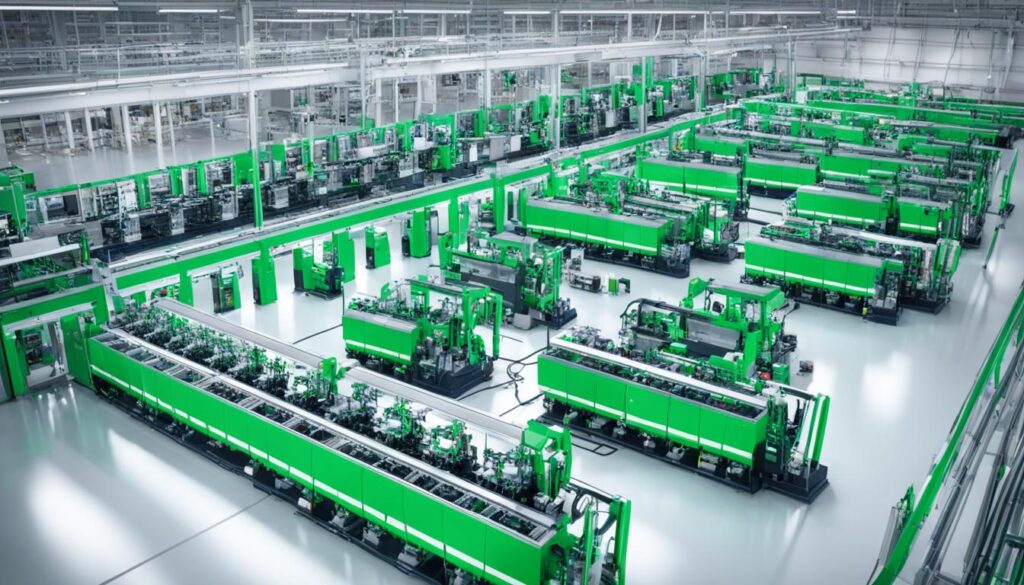Embrace JIT: Unlock Efficiency in Your Operations

“In the race for global domination, it is not the fastest or the strongest that prevail but those who can adapt and respond swiftly to change.” – Charles Darwin
In today’s fast-paced and ever-evolving business landscape, staying ahead requires more than just speed and strength. It demands efficiency, adaptability, and a streamlined approach to operations. This is where Just-In-Time (JIT) manufacturing comes into play.
JIT, a methodology pioneered by Toyota and embraced worldwide, revolutionizes the way companies approach production. By delivering parts and materials precisely when needed, JIT eliminates waste, lowers costs, improves quality, and enables flexibility and responsiveness.
Implementing JIT requires a holistic approach that involves supplier collaboration, streamlined processes, continuous improvement, employee training, and technology integration. When done right, businesses can optimize their inventory management, enhance supply chain efficiency, and achieve operational excellence.
Are you ready to unlock the true potential of your operations? Join us as we dive into the world of JIT manufacturing and discover how it can transform your business.
Key Takeaways:
- JIT manufacturing is a methodology that eliminates waste, lowers costs, and improves quality.
- Implementing JIT involves supplier collaboration, streamlined processes, continuous improvement, employee training, and technology integration.
- JIT optimizes inventory management, enhances supply chain efficiency, and enables flexibility and responsiveness.
- JIT manufacturing is essential for businesses aiming to achieve operational excellence in today’s competitive landscape.
- Stay tuned to learn more about the history, significance, and implementation of JIT in the upcoming sections.
The History and Association with Toyota Production System (TPS)
In the world of manufacturing, Just-In-Time (JIT) has become synonymous with efficiency and waste reduction. However, do you know where JIT originated and how it is deeply intertwined with the Toyota Production System (TPS)? Let’s delve into the fascinating history and associations between JIT manufacturing and TPS.
Post-World War II Japan was a time of rebuilding and economic resurgence. It was during this period that Toyota, under the leadership of Taiichi Ohno and Eiji Toyoda, developed the Toyota Production System. This groundbreaking approach revolutionized the manufacturing industry and laid the foundation for JIT manufacturing.
JIT manufacturing, as a key pillar of TPS, prioritizes waste reduction, continuous improvement, and pull-based production. It aims to eliminate waste by delivering parts and materials exactly when needed, reducing inventory carrying costs, and maximizing efficiency.
As you can see from the image above, JIT manufacturing and the Toyota Production System go hand in hand. Let’s explore the significance of JIT in more detail and uncover the multitude of benefits it brings to businesses.
The Significance of JIT
JIT (Just-in-Time) manufacturing plays a vital role in the success of modern operations. Its significance lies in its ability to reduce waste, lower costs, improve quality, and enable flexibility and responsiveness. By implementing JIT principles, companies can achieve substantial benefits throughout their production processes.
One of the key advantages of JIT is its focus on waste reduction. By minimizing inventory levels and eliminating non-value-added activities, JIT significantly reduces waste in the production process. This not only improves the overall efficiency but also contributes to cost savings by lowering inventory holding costs.
Furthermore, JIT manufacturing leads to improved quality. With a leaner and more efficient production system, companies can identify and address quality issues more effectively. This results in higher-quality products and enhances customer satisfaction. Customer demands are better met, and the company’s reputation for delivering reliable and top-notch products is strengthened.
In addition to waste reduction and quality improvement, JIT also offers increased flexibility and responsiveness. By embracing JIT principles, companies can quickly respond to changes in customer demand or market conditions. The streamlined processes and reduced lead times allow for swift adjustments and the ability to meet customer needs promptly.
The significance of JIT in the manufacturing industry cannot be overstated. Not only does it minimize waste and lower costs, but it also drives improvements in quality, flexibility, and responsiveness. Implementing JIT provides companies with a competitive edge and positions them for success in today’s dynamic business environment.

| Benefit | Description |
|---|---|
| Cost Savings | JIT eliminates wasteful practices, resulting in reduced costs. |
| Improved Quality | By focusing on waste reduction, JIT enhances product quality. |
| Flexibility | JIT enables companies to quickly adapt to changing market demands. |
| Responsiveness | With streamlined processes, JIT improves responsiveness to customer needs. |
Implementing JIT
Implementing JIT, or Just-In-Time manufacturing, requires careful planning and a strong commitment to change. By following these key strategies, you can successfully implement JIT in your operations:
1. Supplier Collaboration
Establish strong relationships with your suppliers to ensure timely delivery of materials and components. Collaborate closely with them to optimize supply chain processes and reduce lead times.
2. Streamlined Processes
Simplify and standardize your production processes to eliminate waste and improve efficiency. Identify and eliminate non-value-added activities to streamline operations and reduce cycle times.
3. Continuous Improvement
Embrace a culture of continuous improvement in your organization. Encourage employees at all levels to identify and implement innovative solutions that enhance productivity, quality, and customer satisfaction.
4. Employee Training
Invest in comprehensive employee training programs to ensure that your staff is equipped with the necessary skills and knowledge to support JIT manufacturing. Train them in lean principles, waste reduction techniques, and quality control methods.
5. Technology Integration
Leverage technology tools for inventory management and production scheduling to enhance visibility, accuracy, and control. Implement systems that enable real-time monitoring and data analysis for effective decision-making.
By implementing JIT, you can achieve significant improvements in efficiency, reduce costs, and enhance the overall competitiveness of your organization. The combination of supplier collaboration, streamlined processes, continuous improvement, employee training, and technology integration will pave the way for successful JIT implementation.

What is Jidoka?
Jidoka, often translated as “automation with a human touch,” is a cornerstone of Lean manufacturing. It empowers machines to automatically detect abnormalities in the production process and stop operations, allowing operators to intervene promptly. This proactive approach ensures quality at the source and prevents defects from propagating downstream.
By implementing Jidoka, manufacturers can achieve greater efficiency, reduce waste, and improve product quality. This methodology aligns with the principles of Lean manufacturing, which focuses on eliminating waste and optimizing processes to deliver value to customers.
Jidoka is not just about automation; it emphasizes the importance of defect prevention and problem-solving. Instead of relying solely on manual inspections, Jidoka automates the detection and handling of defects at the earliest stage possible. This approach significantly reduces the risk of defects reaching the final product and enhances overall quality.
Moreover, Jidoka promotes a culture of continuous improvement, encouraging employees to identify and address issues promptly. By incorporating automated defect detection into the production process, companies can empower their workforce and foster a sense of ownership and responsibility for quality control.
Overall, Jidoka plays a vital role in Lean manufacturing by ensuring consistent quality, minimizing defects, and streamlining operations. Let’s explore the benefits of Jidoka in more detail.
Benefits of Jidoka
Implementing Jidoka in your manufacturing processes offers a multitude of benefits that can transform your operations and drive success. By leveraging Jidoka, you can achieve enhanced quality, cost reduction, increased efficiency, and an empowered workforce.

Enhanced Quality:
Jidoka plays a pivotal role in ensuring the highest standards of quality throughout the production process. By enabling machines to automatically detect abnormalities and stop operations, defects are prevented before they propagate downstream. This proactive approach allows operators to intervene promptly, resulting in products of superior quality and consistency. With Jidoka, you can build a reputation for excellence in every aspect of your manufacturing operations.
Cost Reduction:
Implementing Jidoka leads to significant cost savings in your manufacturing processes. By preventing defects and addressing issues promptly, you can minimize the costs associated with rework, scrap, and customer returns. Additionally, Jidoka streamlines workflows by reducing time wasted on identifying and rectifying defects, enabling you to allocate resources more efficiently and optimize productivity.
Increased Efficiency:
Jidoka enhances operational efficiency by eliminating wasteful practices and non-value-added activities. The proactive defect detection and immediate intervention ensure that resources are utilized effectively, without unnecessary downtime or delays. As a result, your processes become streamlined and optimized, leading to improved production throughput and reduced lead times.
Empowered Workforce:
Jidoka empowers your workforce by fostering a culture of problem-solving and continuous improvement. With the ability to identify and address abnormalities, operators become more engaged and proactive in their roles. This empowerment boosts employee morale, encourages innovation, and cultivates an environment where every individual takes ownership of quality and efficiency. By harnessing the potential of your workforce, Jidoka drives sustainable growth and success.
| Benefits of Jidoka | Description |
|---|---|
| Enhanced Quality | Ensures highest standards of quality by proactively preventing defects. |
| Cost Reduction | Minimizes costs associated with rework, scrap, and customer returns. |
| Increased Efficiency | Streamlines workflows, optimizes productivity, and reduces lead times. |
| Empowered Workforce | Fosters a culture of problem-solving, continuous improvement, and employee engagement. |
Jidoka & Toyota Production System (TPS)
Jidoka is a fundamental principle of the Toyota Production System (TPS) that revolutionized manufacturing operations. Through the integration of Jidoka into their processes, Toyota achieved remarkable levels of efficiency, quality control, and flexibility. TPS, a renowned production methodology developed by Toyota, places great importance on building quality into the production process and closely aligns with Jidoka’s core principles of defect prevention and quality control.
With Jidoka, Toyota introduced a proactive approach to quality control by empowering machines to automatically detect abnormalities during the production process. When abnormalities are detected, operations are halted, enabling operators to promptly intervene and address the issue. This human-machine collaboration ensures that defects are identified and resolved at their source, preventing them from propagating downstream.
By embracing Jidoka as a cornerstone of TPS, Toyota was able to achieve exceptional results. The integration of Jidoka into their production processes helped them maintain high-quality standards, reduce defects, and optimize overall product quality. Furthermore, Jidoka empowered Toyota’s workforce to take ownership of the production process and actively participate in defect prevention.
Jidoka, within the context of TPS, transformed operations by emphasizing the importance of quality control and defect prevention. By combining this principle with other TPS methodologies, such as standardized work and continuous improvement, Toyota was able to establish an environment where defect prevention became standard practice. This relentless pursuit of quality and efficiency has made Toyota a global leader in the automotive industry.
In summary, Jidoka and the Toyota Production System (TPS) are intertwined, with Jidoka serving as a fundamental principle within TPS. By integrating Jidoka into their manufacturing processes, Toyota achieved unmatched levels of efficiency, quality control, and defect prevention. This integration demonstrates the power of Jidoka and its ability to transform manufacturing operations by emphasizing the importance of quality at every stage of the production process.

Conclusion
In conclusion, JIT manufacturing and Jidoka are invaluable strategies that can revolutionize your manufacturing operations. By implementing JIT principles and embracing Jidoka’s proactive approach, you can achieve operational excellence, reduce costs, and deliver superior-quality products that meet customer demands. These methodologies enable businesses to thrive in the highly competitive manufacturing landscape.
JIT manufacturing focuses on streamlining processes, eliminating waste, and optimizing inventory management to drive efficiency and minimize costs. By adopting lean production principles, companies can achieve significant waste reduction and enhance overall operational efficiency. JIT also paves the way for continuous improvement, ensuring that your operations are constantly evolving and reaching new levels of excellence.
Embracing Jidoka empowers your workforce to take ownership of quality and prevent defects at the source. By integrating automation with human intervention, you create a culture of proactive problem-solving and foster an atmosphere of continuous improvement. Jidoka not only enhances product quality but also reduces costs associated with defects, ultimately improving your bottom line.
By combining JIT manufacturing and Jidoka, you can unlock the true potential of your manufacturing operations. These strategies enable you to reduce waste, improve efficiency, and enhance quality, positioning your business for success. So, take the leap, embrace JIT and Jidoka, and propel your manufacturing operations towards excellence.






